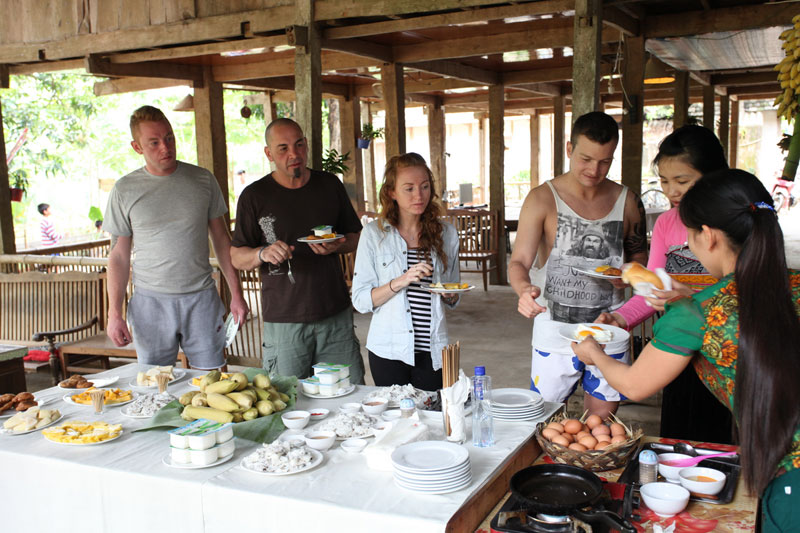
(HBO) Mai Chau district has a cool climate. In the early morning, the white mist covers the mountains and in the afternoon the cloud flies around the mountains, which makes the space poetic. The peaceful villages are looming on the mountainside. People stick together in the flickering light of fire, in the singing and dancing, the drunken yeast of the wine jar needs and the sincere feeling. Over the time, thus, Mai Chau valley has a special attraction for domestic and international tourists.

Tourists enjoy Mai Chau speciality. Photos
were taken in Hich village, Mai Hich commune.
Recently, Mai Chau district recently has many
solutions to attract tourists. Currently, it has 13 hamlets and community
tourism villages with 103 community guesthouses.
In Mai Chau, each season has its own beauty.
In March, Ban flowers are blooming whitely around the hills. In May and June
the rice is gold dyed. In December, the peach and plum flowers are blooming,
welcoming the spring. Tourists visiting and exploring Mai Chau will eat, stay
and work together with the local people. Mai Chau community tourism aims to
harmonize the indigenous people and the tourists. Homestay owners organize
activities for the tourists to experience rice harvesting, plum harvesting,
peach picking. The tourists can rent bicycles to travel around Mai Chau. From
the town centre, visitors can cycle to Chieng Chau commune, visit Lac village.
Not far away is Van village, passing the winding road, coming to Hich and Buoc
villages. The villages are similar because of the living space and customs.
Thai stilt houses are next to each other. The mothers and the sisters are under
the floor, working actively at the weaving loom. In addition, there are many
tourist attractions attracting tourists to explore such as the majestic beauty
of Go Lao waterfall, poetic of Ba Khan lake, the mystic of Mo Luong and Hang
caves. Going further, visitors can discover the customs and habits of Mong
people in Hang Kia and Pa Co communes
Ms. Bui Thi Huong, from Cau Giay (Hanoi)
shared: Every year I go to Mai Chau in summer and early spring. Arriving at Mai
Chau, I feel relaxed and peaceful. Two years ago, I often stayed at Lac and
Hich villages. This year, coming back to Mai Chau, I went to Pa Co to discover
the natural landscapes, Mong customs and traditions ..
With its own attraction, Mai Chau tourism
becomes an important economic sector, contributing to changing the appearance
of Mai Chau valley. In 2018, the district welcomed 332,000 visitors, including
132,500 international visitors, 199,500 domestic tourists. The total revenue
from tourism reached 107,6 billion VND
A diverse chain of eco-tourism and resort destinations concentrated in Hoa Binh city and the districts of Tan Lac, Da Bac, and Luong Son… Along with the launch of several key high-quality resort tourism projects, these developments have reshaped the landscape and enhanced the appeal of Hoa Binh as a travel destination.
Boasting diverse terrain, a mild climate, and rich natural resources, Cao Phong district is increasingly asserting its place on Vietnam’s tourism map, attracting both domestic and foreign visitors. The district is renowned for its stunning landscapes, majestic mountains, a crystal-clear hydropower lake, and the unique cultural identity of local ethnic groups.
With its pristine landscapes, unique cultural heritage of Muong ethnic minority, and an expanding range of visitor experiences, Tan Lac district of Hoa Binh has fast become a captivating destination for both domestic and international tourists.
Until now, Sung village in Cao Son commune, Da Bac district remains the only Dao ethnic community in Hoa Binh province to develop a community-based tourism model. Beyond its untouched natural landscapes, cultural identity serves as the cornerstone attraction for visitors.
Alongside the diverse cultural identities of the Kinh, Muong, Tay, Thai, Dao, and Mong ethnic people, Hoa Binh province is also renowned as the "capital" of the northwestern Vietnamese cuisine, offering unique and distinctive dishes. At festivals, during Lunar New Year (Tet), or on significant family or community occasions, special dishes are prepared, leaving a lasting impression on visitors.
A Phong Linh (Yellow Tabebuia) flower garden in Thang village, Thach Yen commune, Cao Phong district is currently in full bloom, drawing a large number of visitors.



